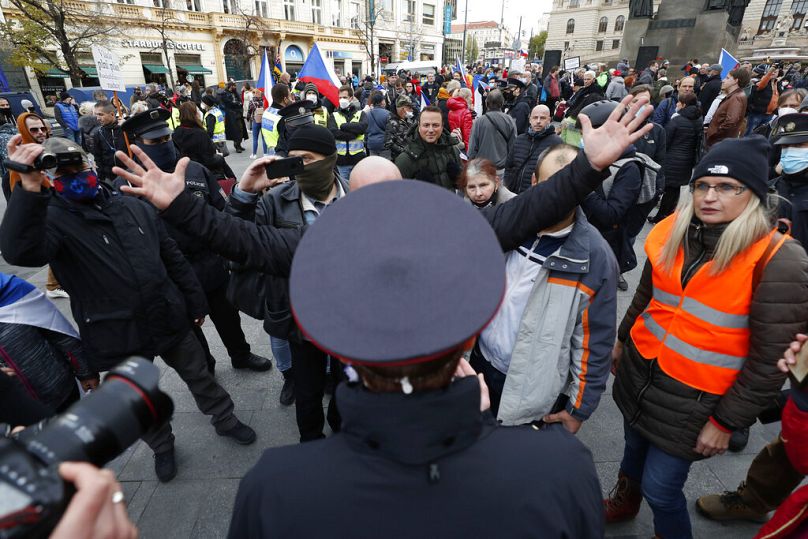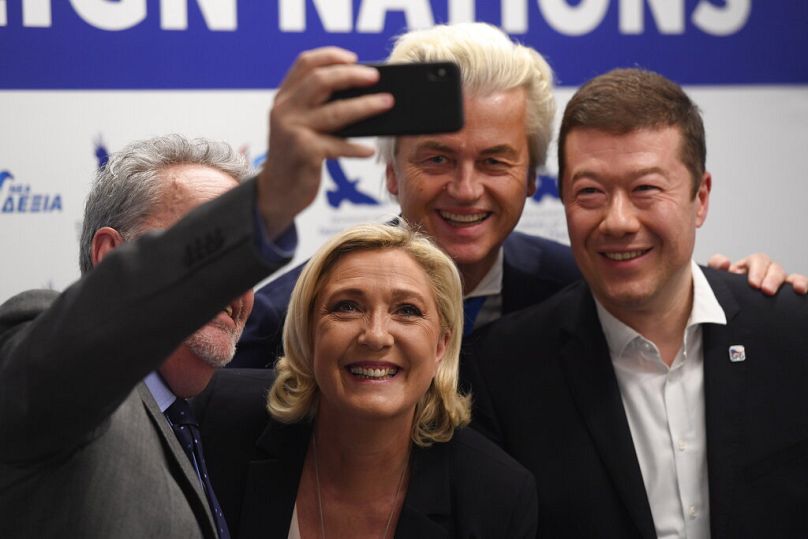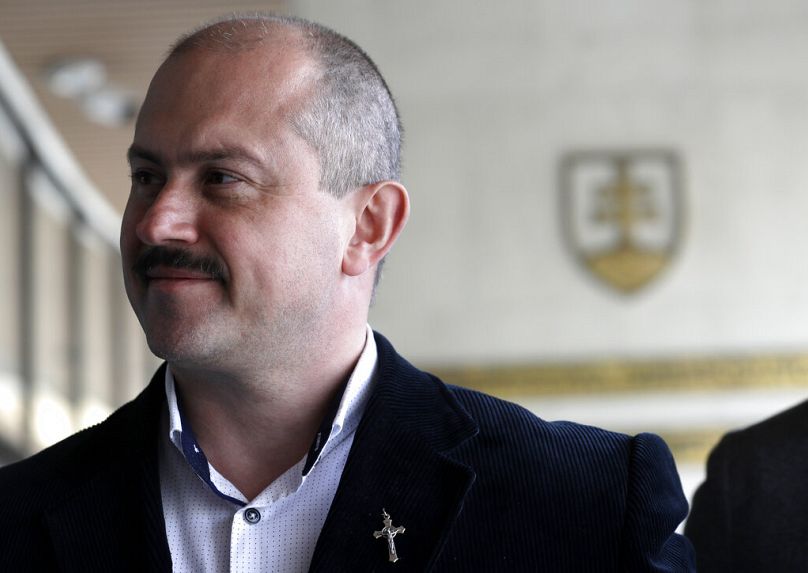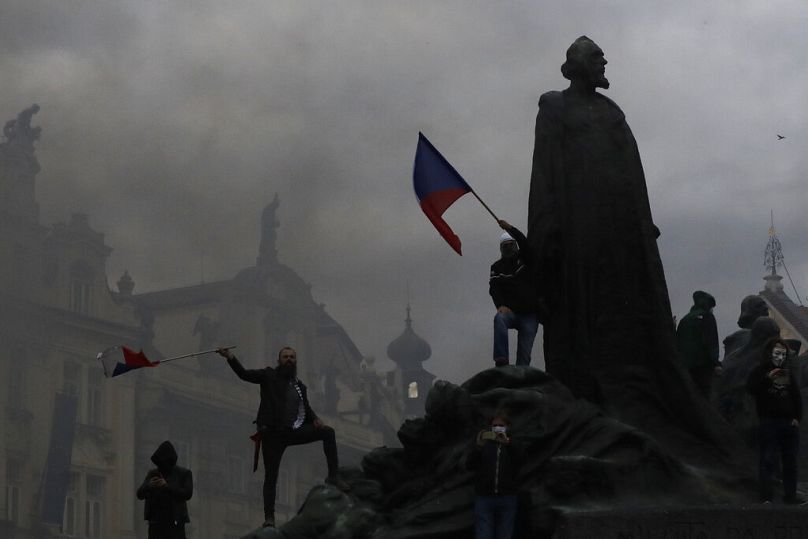It used to be all about football hooliganism and migrants. Now far-right groups in the Czech Republic are turning their focus to COVID restrictions.
A typical Facebook page for the Czech far-right normally features videos of football hooliganism with anti-Semitic codewords and anti-immigration sentiment.
But this year is different. On Boj pokračuje (“The Fight Continues”), one of the main causes has been the fight against the so-called “COVID dictatorship”.
“The Fight Continues” was one of many far-right groups that called on people to protest on November 17 against the Czech government’s pandemic restrictions, a campaign started by an online group called Manifest, whose founder David Tesar wrote on Facebook: "Stop tyranny, stop Covidism, stop government, stop lockdowns".
November 17 is the Struggle for Freedom and Democracy Day in the Czech Republic. It marks both the beginning of the Velvet Revolution that brought down communism in 1989 and the student protests of 1945 against Nazi occupation.
But the authorities ordered people to stay at home this year. Nevertheless, hundreds ignored this order and protested at Prague’s Wenceslas Square. This time, no arrests were made. Demonstrations last month in Prague turned violent as anti-lockdown protesters clashed with the police.
One beneficiary of the anti-lockdown sentiment is the Czech far-right Freedom and Direct Democracy party (SPD).
Its popularity “seems to have strengthened slightly in recent weeks due to the effects of the pandemic,” said Lubomir Kopecek, a political science professor at Masaryk University.
“It seems that the social effects of government restrictions, big economic problems and the decline in trust in the government are favourable for the SPD, which acts as one of the most visible protest voices,” he said.
Tomio Okamura, the Japan-born leader of the SPD and the vice-chair of the Chamber of Deputies, the Czech parliament’s lower house, has - like many of his ilk in Europe - taken a break from anti-immigrant and protectionist rhetoric.
Instead, he castigates government restrictions as a new form of totalitarianism, an evocative message in this former communist state where suspicion of the authorities runs deep.
A survey conducted in early November by European National Panels, a joint initiative by three pollsters, found that only 36% of Czech respondents would like to be vaccinated against the coronavirus (a decrease from a similar poll in mid-October) compared with 46% against vaccination. Many of those who opposed the vaccination, the poll found, were supporters of the SPD.
Across Europe, the far-right has played a visible role in politics this year as the most extreme opponents of government shutdowns and face-mask requirements, as well as spreaders of conspiracy theories relating to the pandemic.
In Germany, thousands of far-protesters attempted to storm the Reichstag in late August. In neighbouring Slovakia (which split from Czechoslovakia during the “Velvet Divorce” of 1993) football “ultras” last month protested alongside supporters of the fascistic People’s Party – Our Slovakia (L’SNS) in Bratislava against the government’s pandemic measures.
Does this translate into votes?
Richard Q. Turcsanyi, an assistant professor at Mendel University in Brno, Czech Republic, says support for the far-right in both the Czech Republic and Slovakia is at a crossroads.
“On the one hand, ineffective and unpopular government policies lead to protests, which include far-right and anti-systemic sympathisers,” he noted.
On the other hand, recent polls in both countries do not suggest a massive surge in support for both parties.
Indeed, across Europe, the prominence of far-right supporters in anti-lockdown protests has not easily translated into increased support for far-right parties.
In early October, the Austrian right-wing Freedom Party (FPO) saw its share of the vote drop from 31 to 7 percent at a general election. In Germany, the far-right Alternative for Germany (AfD) party saw its popularity fall from 24% in October 2019 to 18% last month, according to a Kantar research institute poll.
In Central Europe, far-right parties have managed to cling to their existing support or marginally improve their popularity, but they have hardly made sweeping inroads.
According to Kopecek, the SPD’s gains this year, including picking up 17 seats in the Czech Republic’s regional elections in October, are in many ways a correction to its loss of popularity following the last legislative elections in 2017, when it won 22 seats in parliament but saw three MPs later leave the party. Indeed, it picked up one more MP in September when a senior Social Democrat, Jaroslav Foldyna, crossed the floor to join the SPD.
The L’SNS came in fourth with 8% of the vote in Slovakia’s parliamentary elections in February, the same as it received at the previous general election, but that was before the pandemic began in Europe.
A more recent opinion poll puts their support at around 8.5%, thanks in part to their anti-shutdown messaging. A joint-survey by several Slovak pollsters in early November found that whereas 72% of respondents say they strictly adhere to government restrictions, the majority who don’t were supporters of the L’SNS.
From denial to self-medication
Marian Kotleba, the party’s figurehead, has spent much of the year denying that the coronavirus even exists but he tested positive for it last month, after which he told his followers a mixture of vodka and cough syrup was the way of treating the infection.
Politico Europe noted as early as April: “The virus has made nationalist dreams come true, but far-right parties seem unable to exploit it.”
Several hypothesises have been put forward to explain this: from the marked decline of immigration amid the pandemic to a 'rally around the flag' sentiment amid a crisis. They also face stiff competition from a litany of other anti-establishment parties. At Slovakia’s general election in February, the Social Democrat’s domination of politics was overturned by now-Prime Minister Igor Matovic and his Ordinary People party, which ran on an anti-corruption ticket. At the Czech regional elections in October, the biggest gains were made by the anti-establishment, libertarian Pirate Party.
A political lockdown postponement?
The protests in Prague on November 17 also attracted a good number of liberals and progressives, who came to voice their opposition to Prime Minister Andrej Babis, who was already unpopular for his populism and litany of corruption allegations, but who has also been blamed for his handling of the pandemic.
While the Czech Republic handled the first-wave of the coronavirus relatively well in March through the quick enforcement of strict restrictions, Babis is perceived by some as having over-confidently dropped all restrictions in the summer in order to win support and then delayed stiff responses as the Czech Republic became the worst-affected country in Europe (by percentage of population) in September. Babis is widely accused of having postponed another lockdown until after October’s local election, in which his ruling ANO party increased its vote tally but lost important seats to new coalitions.
Right-wing infighting
There are more specific problems, too. Austria's FPO was reeling after an embarrassing cash-for-coverage scandal while the AfD in Germany is riven by infighting and new competitions from similar-minded parties. Fragmentation is also an issue faced by the Czech hard-right parties. Okamura and his SPD now faces stiff competition from Vaclav Klaus Jnr, the son of the Czech Republic’s first prime minister, who last year created the Tricolour Citizens' Movement (Trikolora) to push his hard-line conservatism infused with populism.
Klaus Jr has been a parliamentarian since 2017 but because of his strong opinions was kicked out of the centre-right Civic Democratic Party (ODS), the party his father helped shaped and the second largest in the Chamber of Deputies. His party is being helped on by the presence of Klaus Snr at the party’s rallies, as well as his participation in the November 17 demonstrations in Prague, where he was “probably the most visible person,” said Kopecek.
Now, Klaus Jnr’s Trikolora party is attempting to compete for space with both the centre-right ODS and the far-right SPD on the same anti-immigration, anti-Roma, euro-sceptic and Czech-first turf, although the SPD is a lot more radical on these fronts.
Both Okamura and Klaus “fit into the role of plebeians, rebels, even outright outsiders, who [claim to] best understand the suffering of ordinary people frightened by migration, by Europeanisation, by an unknown infection,” wrote Lukas Jelinek, of the Masaryk Democratic Academy, in a local newspaper in August.
Turcsanyi, of Mendel University in Brno, said that the far-right’s popularity now depends on how the Czech and Slovak governments handle the pandemic over the upcoming winter months.
Although both states are seeing improvements, if the situation deteriorates again (“which is very much possible,” he said) it might be a big blow to the government and it could embolden the far-right.
Kopecek agrees and says we will only know the true extent of how the pandemic has affected the far-right’s popularity early next year, when the “greatest social impacts of coronavirus will be visible”, and ahead of Czech legislative elections to be held in October 2021.
Kopecek expects the SPD to defend its 10.6% vote share from the last legislative election in 2017. Klaus Jnr’s Trikolora will also be hoping to pick up seats at its first legislative election, although it now has three because of previously-elected MPS crossing the floor to join it.
Every weekday at 1900 CET, Uncovering Europe brings you a European story that goes beyond the headlines. Download the Euronews app to get an alert for this and other breaking news. It's available on Apple and Android devices.















